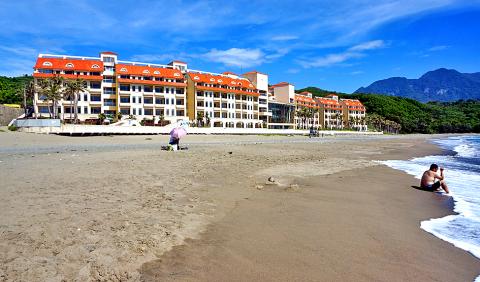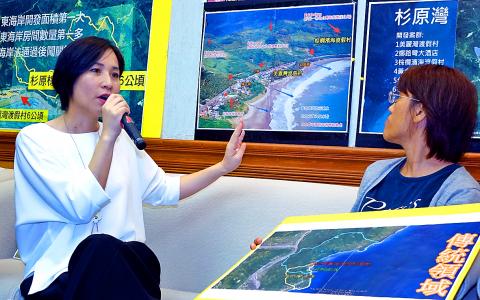Activists and lawmakers yesterday called on the Environmental Protection Administration (EPA) to halt a review of a controversial resort project at Shanyuan Bay (杉原灣) in Taitung County, saying the developer is trying to bulldoze the project without the consent of local Aboriginal communities before the development site is officially recognized as a reserve area.
The Shanyuan Palm Beach Resort (杉原棕櫚濱海渡假村) is the largest development project on the east coast, with a 26-hectare development area — 4.3 times the size of the controversial Miramar Resort Hotel project in Shanyuan Bay, whose environmental approval the court revoked last month.
The EPA suspended the review of the Palm Beach project in July last year, saying the project’s competent authorities — the Tourism Bureau and the Construction and Planning Agency — should clarify the project’s potential conflicts with the Coastal Zone Management Act (海岸管理法), which stipulates the establishment of nationwide coastal reserves by next year.

Photo: Chang Chia-ming, Taipei Times
The EPA’s environmental impact assessment of the Palm Beach project, which is scheduled for today, is once again set to be held amid controversy, with activists calling for the agency to halt the review until coastal reserves and traditional Aboriginal territories are officially zoned.
Lin Shu-ling (林淑玲), a member of an Amis community living in the bay area, said the developer has repeatedly claimed that the development site is not located within traditional Aboriginal territories to circumvent the Indigenous Peoples Basic Act (原住民基本法), which requires developers of a project involving Aboriginal territories to acquire the consent of Aboriginal residents before submitting the project application.
Lin read a statement from the Amis community which said the development would have a dramatic impact on the community and the environment, and the project could not proceed without their consent.

Photo: Chu Pei-hsiung, Taipei Times
Aboriginal communities should also be entitled to lead the planning of coastal reserves, the statement said.
New Power Party Legislator Kawlo Iyun Pacidal rejected the developer’s claim that the bay area is not an Aboriginal territory, saying the Amis have named different locations of the area that do not even have names in Chinese, suggesting Aboriginal people have lived there for hundreds of years.
“The state cannot invade lands belonging to Aborigines in the name of development, and Aborigines’ rights to know must always be protected. The Council of Indigenous Peoples should weigh in on the case and help Aborigines instruct the government in designating traditional territories,” she said.
“The bay is also known as an important turtle nesting beach and coral reef habitat, and development can harm the local ecosystem, especially when the developer illegally started construction before submitting a project plan. How can we trust such a developer to protect the environment?” Citizen of the Earth consultant Tsai Chung-yueh (蔡中岳) said.

Conflict with Taiwan could leave China with “massive economic disruption, catastrophic military losses, significant social unrest, and devastating sanctions,” a US think tank said in a report released on Monday. The German Marshall Fund released a report titled If China Attacks Taiwan: The Consequences for China of “Minor Conflict” and “Major War” Scenarios. The report details the “massive” economic, military, social and international costs to China in the event of a minor conflict or major war with Taiwan, estimating that the Chinese People’s Liberation Army (PLA) could sustain losses of more than half of its active-duty ground forces, including 100,000 troops. Understanding Chinese

The Ministry of Foreign Affairs (MOFA) yesterday said it is closely monitoring developments in Venezuela, and would continue to cooperate with democratic allies and work together for regional and global security, stability, and prosperity. The remarks came after the US on Saturday launched a series of airstrikes in Venezuela and kidnapped Venezuelan President Nicolas Maduro, who was later flown to New York along with his wife. The pair face US charges related to drug trafficking and alleged cooperation with gangs designated as terrorist organizations. Maduro has denied the allegations. The ministry said that it is closely monitoring the political and economic situation

‘SLICING METHOD’: In the event of a blockade, the China Coast Guard would intercept Taiwanese ships while its navy would seek to deter foreign intervention China’s military drills around Taiwan this week signaled potential strategies to cut the nation off from energy supplies and foreign military assistance, a US think tank report said. The Chinese People’s Liberation Army (PLA) conducted what it called “Justice Mission 2025” exercises from Monday to Tuesday in five maritime zones and airspace around Taiwan, calling them a warning to “Taiwanese independence” forces. In a report released on Wednesday, the Institute for the Study of War said the exercises effectively simulated blocking shipping routes to major port cities, including Kaohsiung, Keelung and Hualien. Taiwan would be highly vulnerable under such a blockade, because it

UNRELENTING: China attempted cyberattacks on Taiwan’s critical infrastructure 2.63 million times per day last year, up from 1.23 million in 2023, the NSB said China’s cyberarmy has long engaged in cyberattacks against Taiwan’s critical infrastructure, employing diverse and evolving tactics, the National Security Bureau (NSB) said yesterday, adding that cyberattacks on critical energy infrastructure last year increased 10-fold compared with the previous year. The NSB yesterday released a report titled Analysis on China’s Cyber Threats to Taiwan’s Critical Infrastructure in 2025, outlining the number of cyberattacks, major tactics and hacker groups. Taiwan’s national intelligence community identified a large number of cybersecurity incidents last year, the bureau said in a statement. China’s cyberarmy last year launched an average of 2.63 million intrusion attempts per day targeting Taiwan’s critical